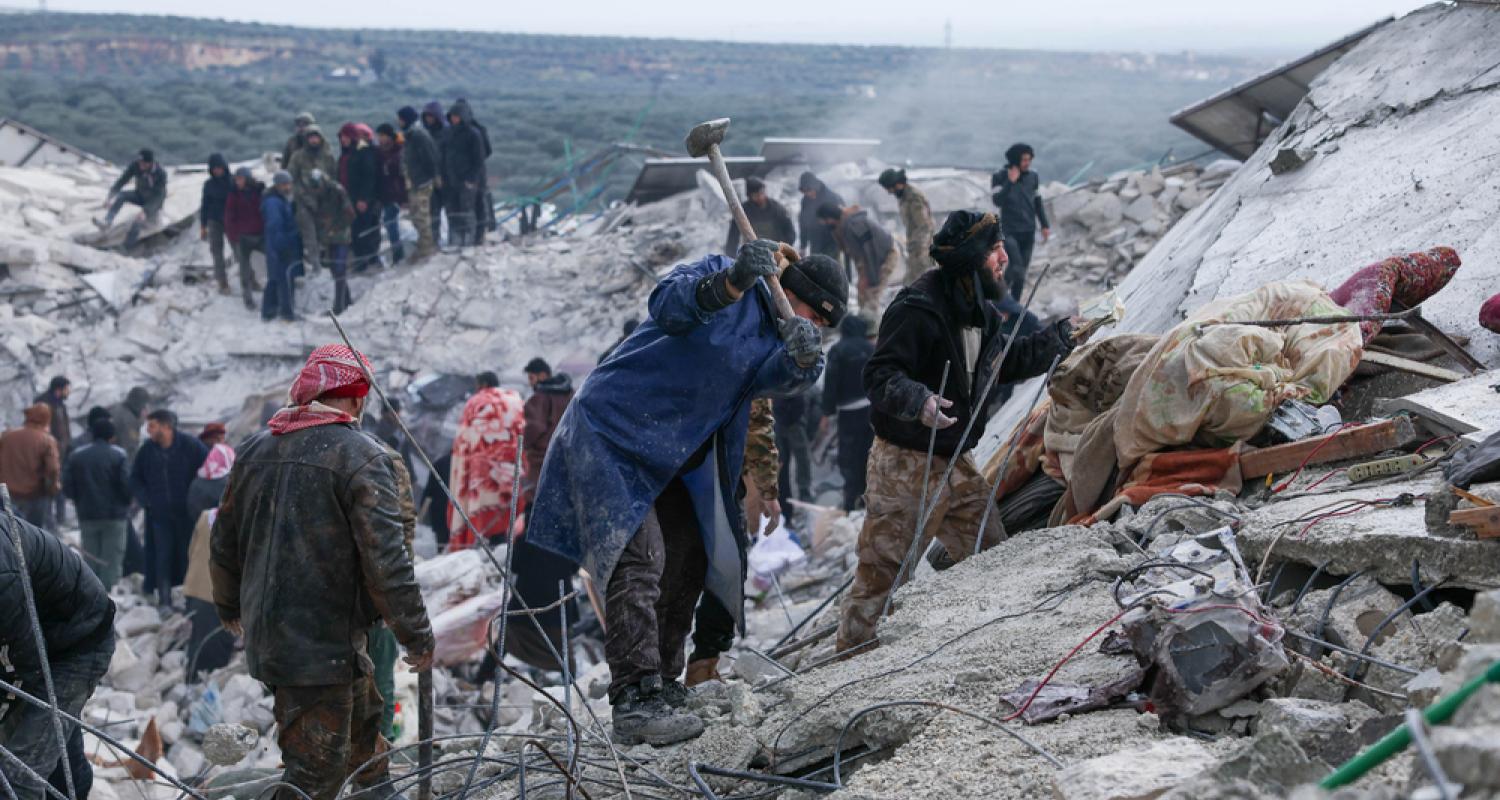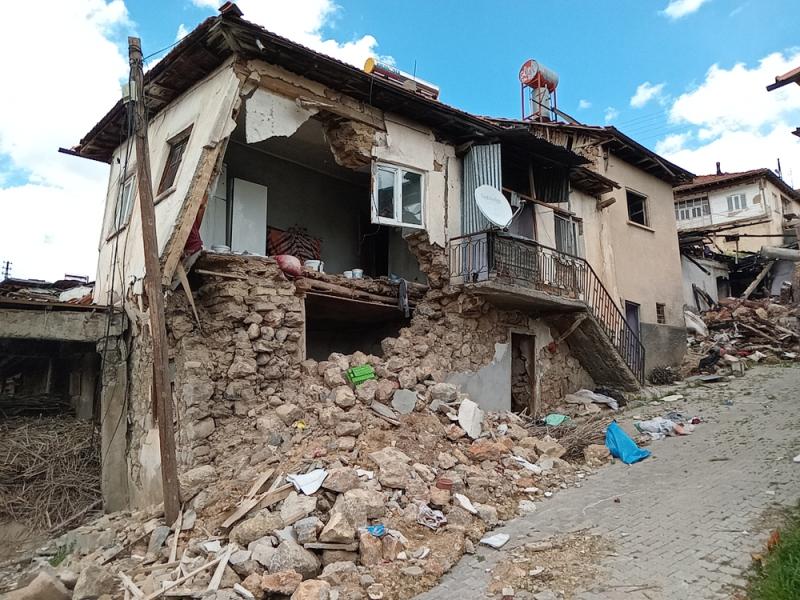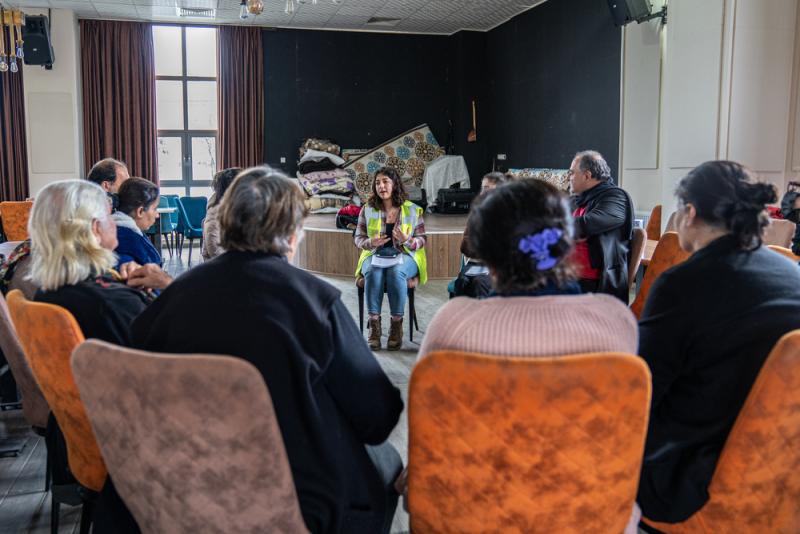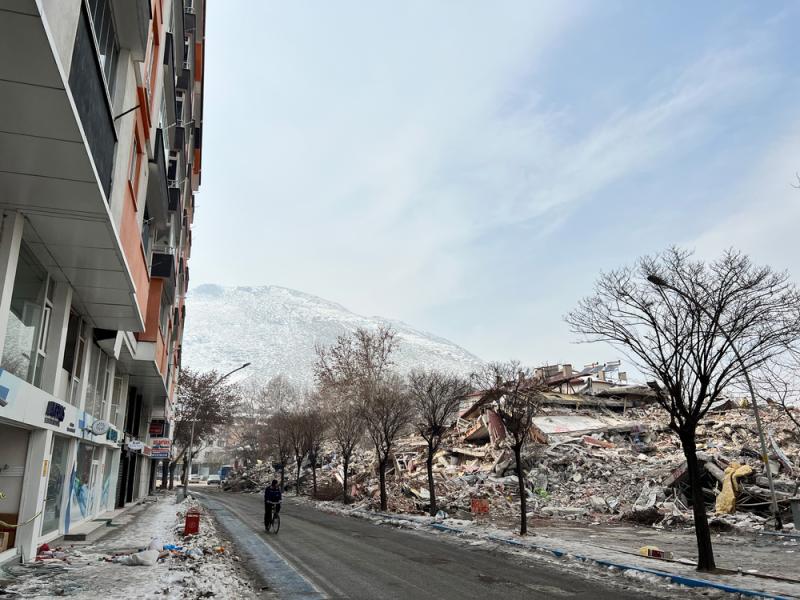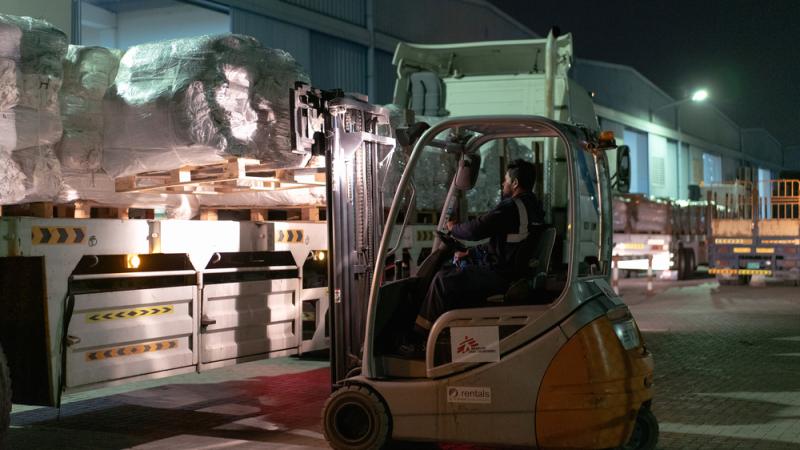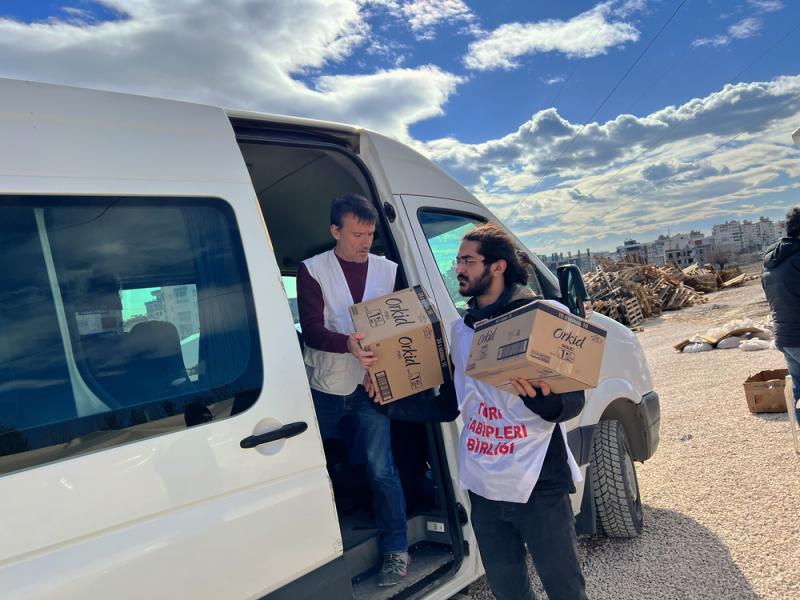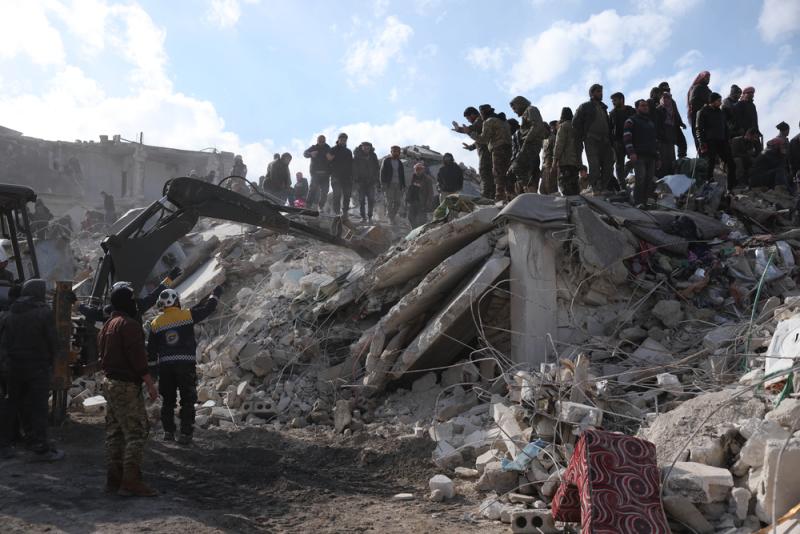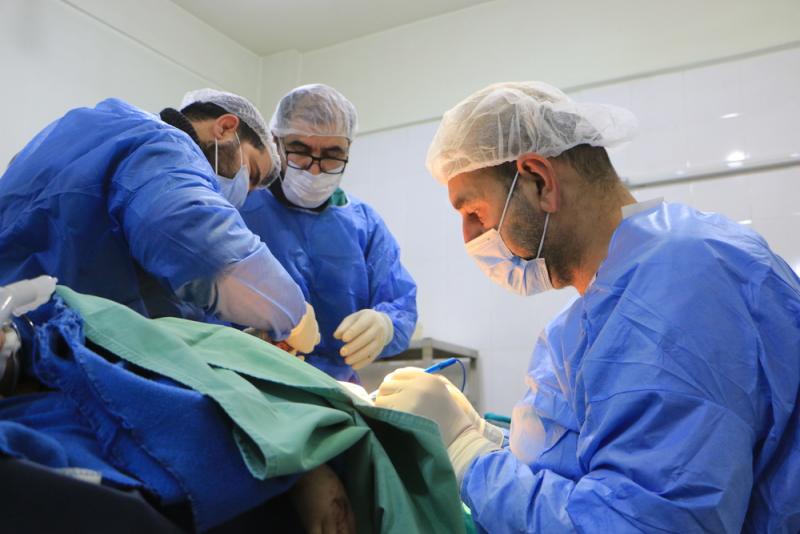Earthquakes hit Türkiye and Syria
On February 6, 2023, magnitude 7.8 and 7.6 earthquakes struck southeast Türkiye and northwest of Syria, between 4:17 and 4:30 a.m. local time. The initial earthquake, which was centred near Gaziantep in south central Türkiye was the deadliest earthquake to hit the region in twenty years. Since then, over 22 thousand aftershocks have happened and continue happening.
Latest update
- We focus on long term strategic activities to ensure the continuity and sustainability of healthcare provision in northwest Syria. We also focus on the post-earthquake’s medical interventions, such as reconstructive surgery, construction of a new maternity in Jindires and rehabilitation of medical facilities, recreational activities, and psychological aid to people, particularly children.
- We are supporting various local NGOs in Türkiye to provide humanitarian relief to people affected by the earthquakes, including psychosocial activities, water and sanitation improvements and relief items distributions and donations, as the humanitarian emergency evolves.
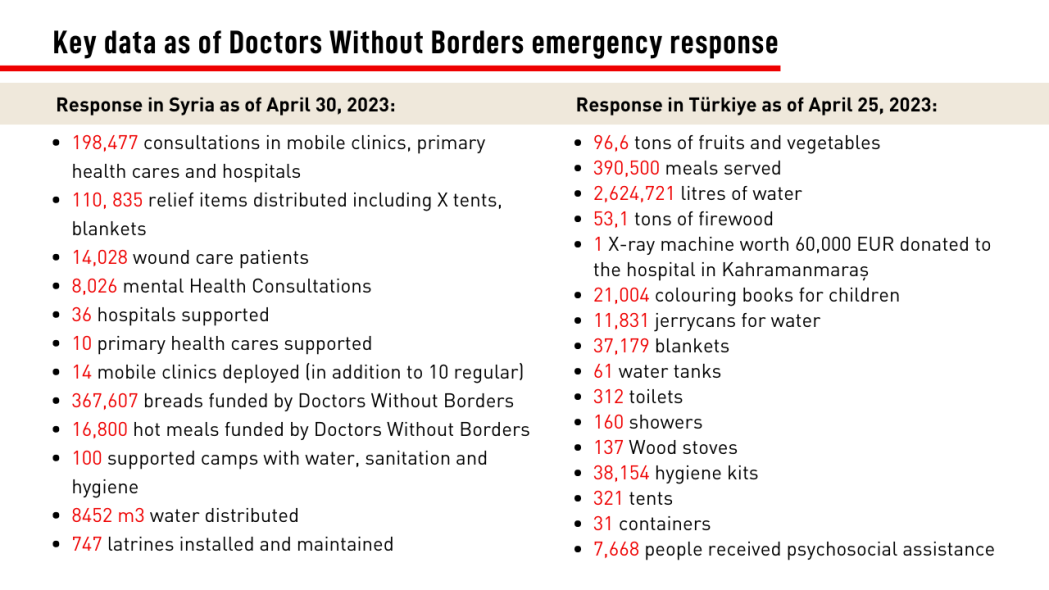
From the first hours, our teams treated around 200 wounded and we received 160 casualties in the facilities and the clinics that we run or support in northern Idlib.Sebastien Gay, Head of Mission in Syria
How is Doctors Without Borders responding in the aftermath of the earthquakes in Syria?
Three months after the earthquakes, about 7,300 deaths, and more than 11,000 injuries were reported in Syria. The humanitarian needs remain acute. The earthquakes wrought major devastation. Buildings got destroyed, infrastructures got damaged, and the needs of people increased drastically.
In northwest part of Syria, even prior to the earthquake, humanitarian situation in the area is already dire. Protracted conflict drives displacement which affected access to healthcare and aid. Cholera outbreak has been declared in Syria, including the north where Doctors Without Borders works, due to contaminated water and worsened by water shortages and weak infrastructure from conflict and funding shortages.
Our response in Syria
In the aftermath of the earthquakes in Syria, Doctors Without Borders teams immediately adapted their response to provide relief and medical support to those affected. In the initial days, Doctors Without Borders focused on supporting medical facilities by providing essential supplies, human resources, and supporting ambulances to transport patients. They also provided immediate relief items to people affected by the earthquakes.
The second phase of Doctors Without Borders’s response involved shifting from an acute emergency response to a more planning and strategic approach that focuses on the unmet needs and gaps. The efforts have been scaled up by distributing more relief items, implementing water and sanitation activities, and continue deploying mobile clinics and offering psychological first aid and mental health support.
More recently, Doctors Without Borders have started the third phase of the emergency response in which it focuses on long term strategic activities to ensure the continuity and sustainability of healthcare provision in northwest Syria. It also focuses on the post-earthquake’s medical interventions, such as reconstructive surgery, construction of a new maternity in Jindires and rehabilitation of medical facilities, recreational activities and psychological aid to people, particularly children.
- NORTHWEST SYRIA
Supporting healthcare provision In Idlib and Aleppo governorates: As an initial response following the earthquakes, Doctors Without Borders supported 32 hospitals and health facilities, through donations of emergency kits, trauma kits medical supplies, and blankets. This includes facilities in Idlib, Atmeh, Azaz, Afrin, Mare’, Bab El-Hawa, among other towns. We also sent medical staff, including surgeons, to support hospitals dealing with the influx of wounded.
In 4 health facilities (hospitals and clinics) in Idlib governorate, we treated injured patients, and we increased the capacity of the hospitals we’re working in by adding triage tents in the outside wards. In addition, we deployed our ambulances, and we supported 90 ambulances to facilitate the transfer of patients in need of emergency assistance to the closest health facilities. Two weeks after we have scaled up efforts deploying mobile clinics and distributing relief items to affected populations.
Mobile clinics: We set up 13 mobile clinics that were deployed in several reception centres and different camps across northwest Syria. The aim is to offer essential medical services to people affected by the earthquakes.
Mental health services: Our teams launched a mental health hotline that is accessible to people, that is being communicated in the community through our health promoters and mental health specialists. In addition, we’re offering mental health services in the mobile clinics and health centers we support, and we’re setting up safe spaces for social and recreational activities for women and children. We are also building a Psycho-social Care Unit (PSCU) strategy to support our Doctors Without Borders staff after the crisis, as they have been impacted by the disaster.
Offering relief support to affected families: In Aleppo governorate, with our local partners, we distributed food and blankets to more than 500 families in the reception centers in Afrin and 840 hygiene kits to displaced people living in camps on the city’s outskirts. We also supplied a bakery with 20 tonnes of flour and 5,000 litres of fuel to enable it to provide bread to the people affected.
In addition, 940 displaced families received a full kit of essential items such as hygiene kits, kitchen kits, blankets, mattresses and jerry cans and 4366 hygiene kits were distributed in 36 camps in Sharran area in Aleppo.
Similarly, in Idlib governorate, our team continues to distribute essential items to the most affected families in over 200 camps across Idlib governorate. 150 tents and 2743 kits were distributed in March to families whose homes were destroyed by the quakes and who moved to camps in Sarmada, Al-Dana, Marat Mersin and other districts. A total of 30,900 blankets have been distributed in northwest Syria.
Offering immediate relief support to people affected by the earthquakes, particularly those without shelter in this cold weather, will remain a priority for our team. We will continue to assess the needs and adapt our response accordingly.
Construction of a new maternity in Jindires, Aleppo: Following the destruction of the maternity centre supported by Doctors Without Borders in Jindires, Doctors Without Borders will help building a new maternity centre to replace the one that was destroyed, and to provide a safe and convenient space in which women can give birth.
Water and sanitation activities: In Idlib governorate, we’re offering water and sanitation activities in 18 camps for displaced population, this includes rehabilitation of latrines, providing water trucking, installation of water tanks, and supporting waste collection services.
Donations/aid into northwest Syria: To continue our support, since the earthquakes, Doctors Without Borders brought in a convoy of 53 trucks including tents, winter kits and other essential items and distributed them to those who were affected by the earthquakes. In addition, 35 tons of medical items have been imported in preparation for scaling up of activities.
- NORTHEAST SYRIA
There was no major damage or injuries reported at or near our projects in Northeast Syria as a result of the recent earthquakes. However, the team is actively utilising any opportunities to provide support to earthquake affected areas elsewhere in Syria.
What is Doctors Without Borders doing in Syria prior to the earthquakes?
In northwest Syria, Doctors Without Borders is supporting 7 hospitals including 1 burn unit, in addition to 12 Primary Health Care centres (PHCs) and 3 ambulances for referrals. In addition, Doctors Without Borders supports 11 mobile clinics serving Internally Displaced People (IDP) camps. Doctors Without Borders is also running Water, Sanitation and Hygiene (WASH) activities in close to 100 IDP camps across the northwest.
In northeast Syria, we run a primary healthcare clinic, NCDs programs, mobile wound care, and a reverse osmosis plant to provide safe drinking water in Al-Hol camp. Doctors Without Borders also supports a hospital, as well as an outpatient department (OPD), ER, and nutrition programming, and currently have a team engaged in a short-term influenza B intervention in response to high child mortality.
In addition, since the announcement of the Cholera outbreak, Doctors Without Borders has been responding by conducting community-based health promotion activities as well as training for relevant healthcare workers. We’re also supporting cholera treatment units, and oral rehydration points in the affected areas in Northwest, and Northeast Syria. Today these activities are on standby as no patients or severe cases have presented themselves to our supported facilities. However, we continue to monitor the evolution of the situation and ready to respond if any developments are to occur.
How is Doctors Without Borders responding in the aftermath of the earthquakes in Türkiye?
According to the Disaster and Emergency Management Presidency (AFAD), as of 22nd of April, more than 51,768 people have died following the earthquakes in Türkiye. More than 9 million people have been directly affected in eleven provinces in the southern part of the country, which hosted a population of 14 million people before the disaster, 16% of the total population of the country, according to the UN OCHA.
Our response in Turkiye
All Doctors Without Borders relief activities in Türkiye are carried out by supporting local organisations. Doctors Without Borders is not registered in Türkiye so this is the model we must use to help people affected.
In the early phase of the earthquake response, NGOs supported by Doctors Without Borders have been active in Adıyaman, Elbistan, Gaziantep, Islahiye district, Hatay, Kilis, Nurdağı district, Kahramanmaraş, Pazarcik, Kayseri, and Malatya.
Local NGOs, supported by Doctors Without Borders, donated generators for energy, hygiene kits and relief items (blankets, sleeping bags, power banks, electrical stoves, diapers and winter undergarments), water and food (both for the affected population and hospitals), showers and tents in the makeshift camps, medical items, tents, and a vehicle for transporting medicine and fuel for mobile clinics. In addition, Doctors Without Borders supported a local NGO in conducting mobile clinics focusing on mother and childcare (prenatal care, neonatal care, infant and childcare), as well as made a medical donation of scabies treatment.
Doctors Without Borders-supported NGOs have also provided mental health and psychosocial support (MHPSS) for people affected by the earthquake, including volunteers and search and rescue teams engaged in the response through individual and group work, as well as by donating pedagogical material for psycho-social workshops.
Today, Doctors Without Borders is supporting various local NGOs in Türkiye to provide humanitarian relief to people affected by the earthquakes, including psychosocial activities, water and sanitation improvements and relief items distributions and donations, as the humanitarian emergency evolves.
Doctors Without Borders remains in close contact with the local authorities in northwest Syria and with the authorities in Turkey to extend our support where it’s needed.
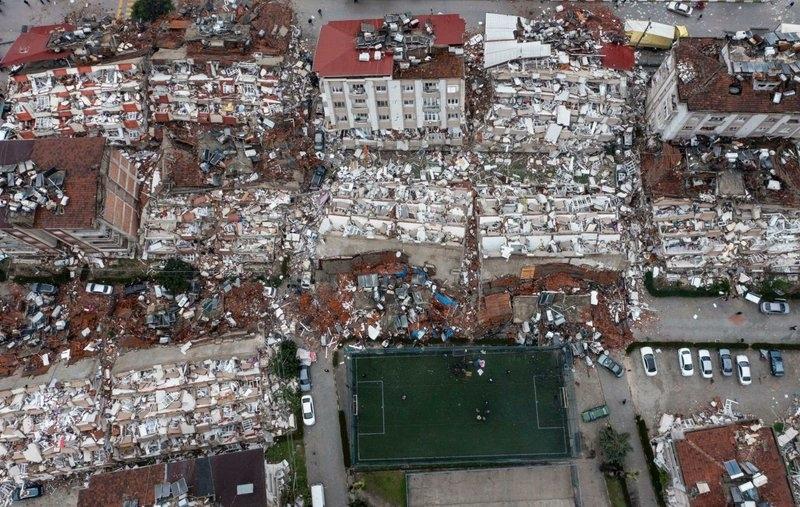
View of Kahramanmaraş after the earthquakes. Türkiye, February 2023. © International Blue Crescent
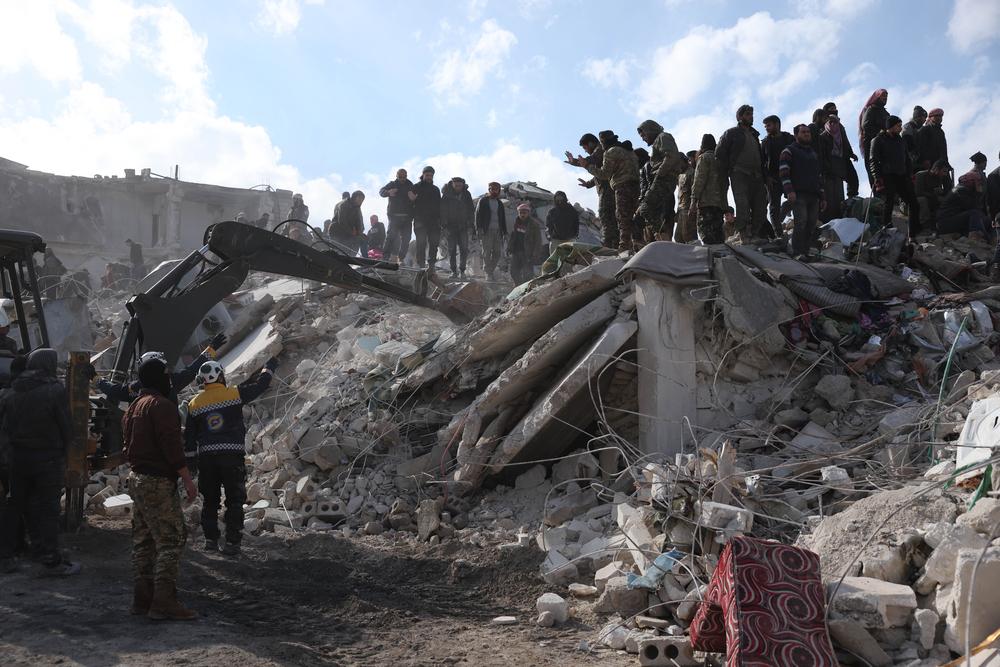
View of Idlib province, Northwestern Syria. Syria, February 2023. © Omar Haj Kadour
Emergency
Help us provide lifesaving medical care for victims of the recent earthquake in Türkiye or Syria today. Support us now by making a donation.
